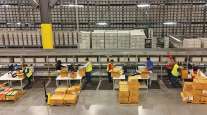Pandemic Puts Added Strain on Drivers

[Stay on top of transportation news: Get TTNews in your inbox.]
For Robert Carrillo, an Averitt Express city driver in Chicago, making deliveries to hospitals and doctor’s offices is nerve-wracking, even though he wears a mask and sanitizes his truck.
“At one hospital, I have to park at the dock and then walk into the front of the building to have my temperature checked before they will accept the delivery. I then have to walk back around the building to the dock to unload the trailer,” he said.
Fleets have been providing personal protective equipment to help protect drivers’ physical health, but Deen Albert, director of operations for Grand Island Express, said it is drivers’ mental health that concerns him.
“Driver stress is at an all-time high,” Albert said. “They have a lot to worry about on the road.”
What’s more, drivers are more isolated than ever as fleets, shippers and truck stops implement social distancing guidelines meant to minimize the spread of the virus.
►Essential Work, Truckers Rise to the Challenge
►Top 100 For-Hire Interactive Map
►How the Coronavirus Pandemic Might Reshape Trucking's Future
►Pandemic Exacts Heavy Financial Toll on Trucking Companies
►Sanitation, Social Distancing Become New Normal in Trucking
Sector Rankings
LTL | TL/Dedicated
Intermodal/Drayage
Motor Vehicle/Driveaway
Tank/Bulk | Air/Expedited
Refrigerated | Flatbed/HS
Package/Courier | Mail
Household Goods/Commercial
“I don’t get to talk to my customers anymore. It’s hard. To cope with it, I talk to other drivers. We are our support system,” Carrillo said.
Sean Linton, an Averitt Express over-the-road driver based out of St. Louis, said isolation on the road was hard even before the pandemic, but is worse now.
“We think twice now before striking up a conversation with a person, which keeps us less social,” he said. “I try to stay in contact with my close friends and family more now just to hear a friendly voice on the phone.”
Before the coronavirus pandemic, drivers reduced their alone time by socializing in driver lounges and enjoying a few minutes of conversation when they sit down to eat, said Rebekah Koon, a driver for Cargo Transporters. “That has been taken away.”
Drivers are longing for those little interactions.
“I miss being able to give handshakes to my fellow coworkers. I miss being able to have a meal at a truck stop surrounded by other drivers,” said Chris Yohn, an Averitt over-the-road driver based in Charlotte, N.C. “There is no real way to combat the isolation. It’s just something we have to live with for now.”
Albert said communication and empathy go a long way in connecting with drivers. Grand Island Express had face-to-face interaction with drivers once a week prior to COVID-19, and the company has transformed that into a virtual town hall conference drivers can dial into.
“I do those once a week at several different times to try to accommodate everybody’s schedule,” Albert said, adding that he tries to address drivers’ concerns and keep them up to date on the latest developments.
Amanda Schuier, senior vice president at Quality Transport Co., started providing a video update for drivers because the office is closed.
“We are also doing a weekly memo to really pull together information for the drivers,” she said.
Quality Transport also is trying to ensure drivers are comfortable with their routes and deliveries.
“If a driver feels unsafe to drive right now, we don’t compel them to work,” Schuier said.
Greer Woodruff, senior vice president of safety, security and driver personnel at J.B. Hunt Transport Services, said the fleet implemented an emergency paid time-off policy that gives an additional 80 hours of paid leave for anyone who was quarantined and wasn’t able to work from home.

What does it take to be a commercial driver, and what are schools doing to train them? Host Michael Freeze speaks with Chris Thropp of Sage Truck Driving School and Don Lefeve of the Commercial Vehicle Training Association. Hear a snippet, above, and get the full program by going to RoadSigns.TTNews.com.
“That has been effective,” he said. “People are willing to say, ‘I might have been exposed or feel like I might have the symptoms.’ ”
Even if drivers aren’t being quarantined, they have been asked to stay in their trucks more and more, which is adding to their stress, said Ingrid Brown, an owner-operator.
“Deciding you don’t want to do something and knowing that you can’t do something are two different things,” she said.
Some drivers are staying on the road for longer stretches of time. Cargo Transporters’ Koon has family members who are immunocompromised, so she decided not to go home until the pandemic concerns are over or there are better testing sites in place.
Koon said she is fortunate because her truck cab is on the bigger side.
“When you’re in isolation as a trucker, that 10 feet or 7.5 feet is everything,” she said.
Besides a lack of interaction, social distancing has made even simple tasks, such as getting a meal or doing laundry, more difficult, Koon said.
“I think the best thing is for people to keep in mind what truckers are going through so they have more patience,” she said.
Want more news? Listen to today's daily briefing:
Subscribe: Apple Podcasts | Spotify | Amazon Alexa | Google Assistant | More





